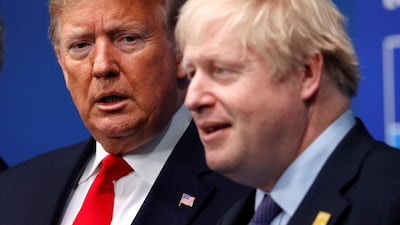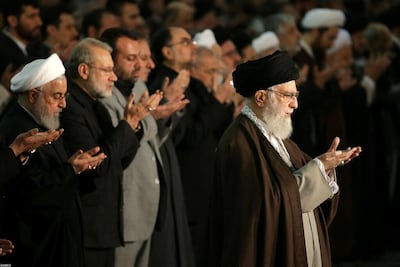If President Donald Trump believes that Boris Johnson’s triumphant election victory at the end of last year will result in a new golden era in US-UK relations, he might need to think again in light of the British prime minister’s less than enthusiastic engagement with Washington in recent weeks on a number of issues, not least Iran.
That the two leaders enjoy a strong personal accord is not in doubt. The president has openly identified with Mr Johnson’s irrepressible campaigning style, as well as his willingness to challenge the political status quo – an attitude that has been defined by his uncompromising approach to Brexit.
The president signalled his admiration for Mr Johnson when the latter first took up residence in Downing Street last July by tweeting he was known as “Britain Trump”. He was also one of the first world leaders to congratulate Mr Johnson on his election victory in December, promising a “massive new trade deal” between the US and Britain once the Brexit process had been completed. At this week’s Davos summit Mr Trump again demonstrated his support, describing Mr Johnson as a “wonderful prime minister.”
Yet judging by Mr Johnson’s measured response to the Trump administration’s assassination of Qassem Suleimani, the notion that US-UK relations are experiencing a revival not seen since the heyday of the Ronald Reagan-Margaret Thatcher era may prove to be premature.
The British response was not helped by the fact that the White House made no attempt to give Mr Johnson prior warning of the attack, even though Britain has been Washington’s closest and most reliable ally in the campaign against Islamist-inspired terrorists for the better part of two decades.
This put Mr Johnson, who was holidaying on the Caribbean island of Mustique when the assassination took place, at a distinct disadvantage when it came to defending the action, which he did eventually in the House of Commons a few days later, telling MPs he did not lament the demise of the Iranian terrorist, who had “the blood of British troops on his hands”.
Mr Trump, though, will be less impressed with the insistence of Mr Johnson, in common with other European leaders, on persisting with the 2015 nuclear deal with Iran.
While Mr Trump has called on the three European signatories to the deal – Britain, France and Germany – to join the US in withdrawing from an agreement he says is “defective”, Mr Johnson made it clear that he has no intention of withdrawing Britain from the nuclear deal. On the contrary, during a 20-minute phone call with Iran's President Hassan Rouhani earlier this month, Mr Johnson reaffirmed his commitment to the agreement, with British officials briefing that Downing Street still believed it was the “best arrangement” to prevent Tehran from acquiring nuclear weapons.
Thus, in the first major test of the transatlantic relationship under Mr Johnson’s premiership, the prime minister has demonstrated an independent mind-set that will not always be to the president’s liking.
Mr Johnson’s preference for sticking with the Iran deal is, in part, driven by his desire to maintain good terms with Berlin and Paris, which are also invested in the agreement, as France and Germany will be key players in the crunch talks taking place later this year on Britain’s post-Brexit trading relationship with the EU.
But it is also borne of a genuine belief on the part of Mr Johnson that maintaining a diplomatic engagement with Tehran is the best way to defuse tensions in the Middle East.
Nor is the Iran issue the only one where there is likely to be a significant divergence of opinion between London and Washington.
For example, the Trump administration’s enthusiasm for negotiating a wide-ranging trade deal with Britain post-Brexit will not necessarily be reciprocated by Downing Street when it comes down to the finer details. The first challenge will be to see the precise terms of the trade deal Mr Johnson strikes with the EU, and how much freedom it will allow the UK to negotiate deals with non-EU states.
Mr Johnson’s pledge that he wants a complete break with the EU’s trading bloc has been received with a degree of scepticism among some committed Brexiteers in the Conservative Party, who fear that he will be tempted to agree to a degree of regulatory alignment with EU in order to ensure frictionless trade with the continent. Such an arrangement would impose limits on Britain’s ability to negotiate trade deals with the likes of the US. An indication of the difficulties that might lie ahead in US-UK trade talks surfaced at Davos, with the Trump administration hinting it might impose trade tariffs against Britain if the latter goes ahead with plans to impose a two per cent tax on US tech firms such as Google and Amazon.
Another potentially problematic issue for the White House would arise if, as seems increasingly likely, Britain continues with its plans to allow the Chinese telecoms giant Huawei a key role in building the country’s new 5G network.
The US, in common with other key members of the elite Five Eyes intelligence-sharing network, is reluctant to allow Huawei access to sensitive communications networks because of its close ties to the Chinese government, and fears that the company could be used to spy on its western adversaries.
British security officials insist they are confident they can take measures to protect the 5G network from outside interference but senior officials in the Trump administration have already raised concerns about future intelligence-sharing cooperation with Britain if Huawei’s UK investment is allowed to continue.
Consequently, while Mr Trump might, on a personal level, enjoy a cordial relationship with Mr Johnson, policy differences on a number of significant issues suggest it will not all be plain sailing for the future of US-UK relations in the years ahead.
Con Coughlin is the Telegraph’s defence and foreign affairs editor



